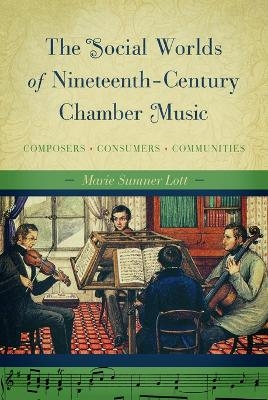
The Social Worlds of Nineteenth-Century Chamber Music
University of Illinois Press (Verlag)
978-0-252-03922-5 (ISBN)
- Titel z.Zt. nicht lieferbar
- Versandkostenfrei innerhalb Deutschlands
- Auch auf Rechnung
- Verfügbarkeit in der Filiale vor Ort prüfen
- Artikel merken
Insightful and groundbreaking, The Social Worlds of Nineteenth-Century Chamber Music revises prevailing views of middle-class influence on nineteenth-century musical style and presents new methods for interpreting the meanings of musical works for musicians both past and present.
Marie Sumner Lott is an associate professor of music history and literature at Georgia State University and a winner of a 2013 ASCAP-Deems Taylor award.
CoverTitleCopyrightContentsList of Figures and TablesList of Musical ExamplesAcknowledgmentsIntroduction. String Chamber Music and Its Audiences in the Nineteenth Century1. Publishing Chamber Music: Archival Evidence for Chamber Music Production and Consumption2. “Domesticating” the Foreign in Arrangements of Operas, Folk Songs, and Other Works for Chamber Ensembles3. Music for Men of Leisure: An Examination of the Domestic String Style4. Redefining the “Progressive” Style in Responses to Beethoven’s Late Quartets5. Creating “Progressive” Communities through Programmatic Chamber Music6. Audience and Style in Brahms’s String Chamber Music7. The Diversity of Dvořák’s String Quartet AudiencesAppendix 1 J. Strunz, string quartet transcription of no. 18, “Prière” (Prayer), from Meyerbeer’s Robert le DiableAppendix 2 C. W. Henning, string quartet transcription of no. 8, “Leise, leise, fromme Weise” (Gently, gently, pious words), from Weber’s Der FreischützAppendix 3 M. Kässmayer, string quartet arrangement of “Mein Herz ist im Hochland” (My heart is in the Highlands) from Deutsche Lieder, op. 14, no. 4NotesBibliographyIndex
| Erscheint lt. Verlag | 9.6.2015 |
|---|---|
| Zusatzinfo | 5 black and white photographs, 2 charts, 77 musical examples, 21 tables |
| Verlagsort | Baltimore |
| Sprache | englisch |
| Maße | 156 x 235 mm |
| Themenwelt | Kunst / Musik / Theater ► Musik ► Klassik / Oper / Musical |
| Geschichte ► Teilgebiete der Geschichte ► Kulturgeschichte | |
| Geschichte ► Teilgebiete der Geschichte ► Sozialgeschichte | |
| ISBN-10 | 0-252-03922-X / 025203922X |
| ISBN-13 | 978-0-252-03922-5 / 9780252039225 |
| Zustand | Neuware |
| Haben Sie eine Frage zum Produkt? |
aus dem Bereich


